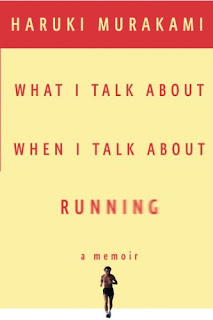As someone who has been planning to start jogging since the better part of this year, I had been avoiding to read this book, lest it might bring about some guilt-trips. However, I finally sat with it last weekend, and finished it off in a day: it’s a small book, about 130-pages.
What I Talk ABout When I Talk ABout Running
Author: Haruki Murakami
Translated by:
Murakami is a “running writer”; he has been running at least 5-6 kms a day for more than last two decades. He is typically a long-distance runner and participates in at least one marathon a year.
The book is indeed based on running but goes beyond being limited to a journal where the author meticulously tracks his development from amateur to a pro. As Murakami puts it, it is a memoir centered on running.
He begins from his struggle to make the ends meet, setting up a coffee shop, his first forays into writing, the decision to shut the coffee shop and devote full time to writing. Then he delves into his modus operandi towards running, the preparations required for undertaking long-distance competitions, the fleeting thoughts that pass through a runner’s mind and the transformations that a runner’s body goes through over the period.
He draws some interesting parallels between running and writing. To succeed in writing, just as in running, the author (or the runner) should have clear priorities, focus to drive away distractions, and endurance to keep working at the process. Frankly, as Richard Feynman aptly remarked in Surely You’re Joking, Mr. Feynman: “One can draw such parallels between any two subjects (for example, poetry and theoretical physics) and hence such analogies are not of much use”.
What really make the book worth a read, at least in my opinion, are Murakami’s observations about the nature and the people he comes across as he runs and his narratives of some of his more daring running adventures. It is a pleasure to read his description of his running the course of the actual Marathon (from Athens to Marathon) and it is equally scary to read his torturous journey in the Japan ultramarathon.
Throughout the book, Murakami comes across as an underdog, a tender yet a resolute person, someone with a never-say-die attitude.
The language of the book is ‘pretty simple’ and ‘sort of laid back’. Actually, these are the phrases that repeat themselves a bit too many times, but ‘as I mentioned before’, it is small book and one can put up with such trifles.
This being the only book of Murakami I have read as yet, it is difficult to know whether he deliberately chose this style or whether it is trademark Murakami.
You should read this book, even though you may not be a runner…. In fact, especially if you are not a runner, because it might just nudge you to shake yourself a bit and move around!


